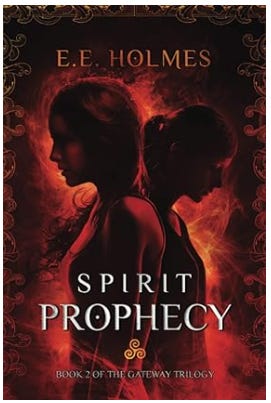The 3 most polarizing characters in Spirit Prophecy who would be enigmas to libertarians
Spirit Prophecy fuels libertarian insights unlike any other book in the Gateway Trilogy, and three characters hand us the good old ‘love-hate’ relationship.
Spirit Prophecy, in case you haven’t already realized, is the one book in the Gateway Trilogy that I could probably write a book about. I may’ve said that its predecessor, Spirit Legacy, is my favorite in the series, but I’ve lately been rethinking that, given the libertarian concepts in Prophecy, and they extend to the characters.
Heck, I’m at the point now to where Spirit Prophecy wasn’t a book that I read this time around. Instead, I studied Holmes’ instant classic, especially that climax. But, I’ll talk to you about the climax another day as I move on and start reading (and not studying) Spirit Ascendency, before I move onto a book that turns 100 this year.
As I’ve always stated when writing these pieces, I doubt E.E. Holmes is a libertarian, herself. So, E.E., if you’re reading these, I don’t want you to think I’m trying to say you’re something that you might not be. But that doesn’t mean we can’t break down plot lines, the Durupinen regime, and characters from a libertarian angle.
Today, it’s all about the characters and there are three who you’ll probably love, then not feel so sure about. Or, you may not like them at all, then end up liking them a little more. Anyway, I wanted to start with my absolute favorite character introduced in this book and second-favorite overall, Fiona.
Fiona is an absolute lunatic, or is she?
Every time Fiona’s in a scene, whether it’s in the Gateway Trilogy or Gateway Trackers, I can’t help but laugh. This is a character who Jess isn’t too sure about at first, and one who’s resorted to throwing chairs, eating bruised fruit off the floor, and being so short-tempered that she’ll shout answers for the most benign questions or statements. Most of the time, anyway.
But there’s hardly a character more anti-establishment than Fiona. She’s not the keenest on Durupinen secrecy, she doesn’t siphon energy from spirits to maintain a youthful appearance, nor is she interested in status symbols.
When the Council is ready to lay the hammer down on Jess and Hannah without the duo being convicted of anything except for the fact they fit the Isherwood Prophecy, she’s one of just a tiny number willing to go to bat for them. You can’t say the same for most of the other characters, especially those who wield political power.
She’s basically the Gateway Trilogy’s version of Professor Snape, except she has no vendetta against the main character. And she’s one who, despite her short, perpetually angry facade, is arguably the character who sticks to her values without wavering often.
Siobhan is that character you’ll like…for a while, at least…
Pronounced shee-vahn, in case you wanted to avoid the same mistake I made when I first read Spirit Prophecy and kept calling her seeob-han. Now that I know a thing or two about Celtic pronunciations, that’s no longer an issue. Anyway, Siobhan is, in a sense, the opposite of Fiona.
She comes across as friendly, but firm, and was quick to welcome Jess and Hannah. Especially Hannah, for whom she briefly served as a mentor. Jess even suspects her Aunt Karen requested Siobhan to pair with Hannah.
There’s also a scene when Siobhan tells off our Mean Girls, Peyton and Olivia, for deliberately sparking a conversation in class to remind Jess and Hannah of the way their mother wreaked havoc on the Gateway. Which is the basis for why Jess and Hannah are outcasts.
But, near the climax, and when the Council is laying the hammer (didn’t I already say that once?) on Jess and Hannah and overseeing the coup involving Finvarra, Siobhan betrays them and goes with the majority vote. While you can tell by Siobhan’s body language that she didn’t like the fact she rolled with the majority, she nonetheless showed some, or a lot of, cowardice.
Finvarra is arguably the most complex character here
Finvarra, the High Priestess of the Northern Clans, is someone who you can tell is aging, but siphoning that energy from those spirits has kept her young. You’ll learn something even more significant about Finvarra in the Gateway Trackers, which I’ll get to at some point way down the road, but in Spirit Prophecy, you have someone who is, well, hard to understand.
On one hand, you can tell Finvarra is rather fair to Jess and Hannah. But on another, you can’t help but wonder if Finvarra is in love with her position as the High Priestess. Then again, her actions as the story progresses about refusing to bend to Marion’s will to imprison Hannah and her refusal to acknowledge that the Ballard twins are the likely subjects of the Isherwood Prophecy shows otherwise.
Jess got the vibe that Finvarra was mysterious, and she’s right. Because one can’t help but acknowledge just how much Finvarra knew about the Durupinen’s deepest secrets - which is further revealed in the Gateway Trackers. Secrets that she had no problem keeping.
But she’s also fair, to a degree. All of that said, a libertarian would look at Finvarra and would be rightfully never sold on her. Still, it’s worth giving credit where it’s due, and Finvarra could’ve easily had Jess and Hannah imprisoned, even without evidence, or circumstantial evidence at best, that they were subjects of the Isherwood Prophecy.



